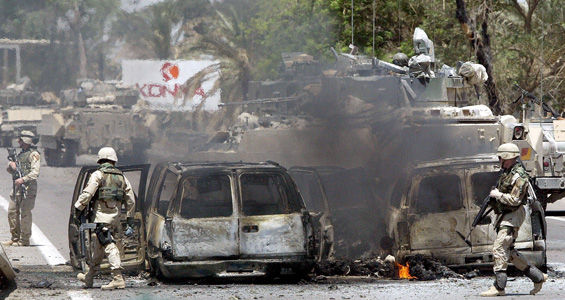‘They kept pumping bullets into us’
Iraqis frustrated by Blackwater verdict but say fight for justice will continue.

 |
| US soldiers inspect the site of an attack on a private security firm convoy in Iraq [File: EPA] |
The Iraqi government is under increasing pressure to aggressively pursue the prosecution of American military personnel accused of killing Iraqis.
The recent decision by Ricardo Urbina, a district judge, to dismiss charges against five security contractors accused of gunning down 17 Iraqis, including women and children, in September 2007 has re-ignited deep discord among Iraqis, and fuelled suspicions that US personnel operate in a lawless void while in Iraq.
An Iraqi investigation into the incident two years ago contradicted Blackwater claims that its contractors had fired in self-defence after coming under attack in central Baghdad. In January 2008, the Iraqi government barred Blackwater from providing security detail to US diplomatic staff in the country, citing the firm’s use of excessive force.
| in depth | |||||||||
|
A US congressional investigation into Blackwater operations appeared to corroborate Baghdad’s accusations that the firm routinely used “excessive” and “pre-emptive” force. In November 2007, FBI investigators found that 14 of the 17 killings had been “unjustified” and violated “deadly force rules” for security contractors operating in Iraq.
However, Urbina threw out the case last week saying that US justice department prosecutors had improperly used sworn statements that had been given under a promise of immunity.
While the Iraqi government said it regretted the judge’s decision and vowed to appeal the ruling, ordinary Iraqis are left wondering at the apparent double standards of a legal system which could pioneer rendition, imprisonment and torture based on far less evidence, but fumble a case like this.
However, Mohammed Kinani, whose nine-year-old son Ali was killed in the shooting, told Al Jazeera that Urbina’s dismissal does not signal the end of the criminal or civil cases brought against Blackwater.
“The FBI has been investigating this case for 27 months and there are witnesses to the event as well as forensic evidence which indicate that this is not the end of the road,” he said.
‘Utter devastation’
Kinani, his sister, her three children and Kinani’s son were in a car in Nisour Square on September 14 when Blackwater guards instructed them to stop.
“A few minutes after several cars in the square stopped, they opened fire on us,” Kinani said.
“My son was hit, my sister was lightly injured, my car was hit by dozens of rounds. A man in front of me was killed and lying in a pool of his own blood and every few moments they would fire on him again … they continued pumping bullets into us.
“They utterly devastated everything in front of them. As if they were bent on revenge.”
Haitham Ahmed, whose wife and son were killed in the shooting, told the Associated Press that the way the prosecution handled the case raises doubts over whether the US justice system could deliver a fair verdict.
“If a judge … dismissed the trial, that is ridiculous and the whole thing has been but a farce,” he said.
Dahlia Wasfi, an Iraqi-American who is currently writing a book about the “illegal occupation of Iraq”, says that Iraqis have largely given up on waiting for justice “or democracy, for that matter”, from Washington.
“There are over 1.3 million dead Iraqis who deserve justice. There are over 5 million displaced Iraqis who have the right of return to a safe country who deserve justice. What the United States has to understand is that without justice, there will be no peace,” she says.
Immunity to impunity?
 |
| Blackwater security guard Nick Slatten, centre, leaves court with his attorneys [REUTERS] |
But Blackwater Worldwide, since renamed Xe Services, is not the only security contractor operating in Iraq.
Since the US-led invasion and occupation in 2003, more than 100 private security firms have set up shop in Iraq, many of their names and mandates unknown to the media.
All have been granted immunity from Iraqi prosecution under an agreement signed by Paul Bremer, the Coalition Provisional Authority head, and the Iraqi Governing Council, an interim political body established after the fall of Baghdad, in 2004.
Despite the handing of sovereignty to Iraqis on June 30, 2004, this immunity exemption remains in effect today.
In fact, private security firms in Iraq, much like Blackwater, took over major tasks and operations, which had previously been primarily assigned to US forces. The hope at the time had been that US forces would remain in their barracks, avoid improvised explosive devices (IEDs) and ambushes, reduce the body count, and keep the US public firmly behind the war. In effect, private security firms become the de facto military presence in Iraq – outnumbering the official count of non-US military “coalition” forces.
As of November 2007, Blackwater had earned more than $485mn in government contracts.
“Iraqis are certainly aware – far more aware than Americans – that there are numerous groups, armies, and militias working under the occupation to devastate Iraqi society and terrorise them. Blackwater and its henchmen are known in Iraq; in March 2008, Iraqi doctors in Falluja named an outbreak of severe malarial infection ‘Blackwater Fever’ because it’s so lethal,” says Wasfi.
Cursory investigations
The US government has no means of monitoring who the private security contractors are, what they do or how much they are paid and, in June 2009, a US congressional Wartime Contracting Commission found that the US military had failed to provide adequate oversight of private contractors in Iraq and Afghanistan.
Iraqis have grown tired of the explanations repeatedly offered as justification for the killing of civilians and say US investigators have only offered cursory investigations, usually siding with the accounts of private security firms.
Amnesty International USA has also been critical of the way the US government has handled accusations of impropriety by private security contractors, saying that “the US justice department has largely failed in its obligation to prosecute US contractors for serious human rights violations, and worse, it appears to have taken steps to undermine access to justice”.
In his ruling, Judge Urbina said that lead prosecutor Ken Kohl and others “purposefully flouted the advice” of senior justice department officials who told them not to use the statements that he eventually ruled as impermissible.
Whether the prosecution’s faux pas was the result of incompetence or willful sabotage is immaterial at this point; the Blackwater case was seen as a test of future Iraq-US relations, particularly given that US combat troops are to fully withdraw from Iraq by 2011.
The case also marked the culmination of years of frustrated efforts by Iraqi civilians and politicians to hold accountable not only private contractors, but the US military as well, for excessive use of force.
Kinani says his family is still distraught about the killing of his son but that he derives strength from knowing that the Nisour Square incident not only brought Iraq’s Shias and Sunnis together but also revealed what ordinary civilians were facing under occupation.
“The killings in Nisour Square woke the Iraqi and US authorities to the horrors of what such security firms were doing in Iraq,” he said, “and motivated them to take legal action.”
